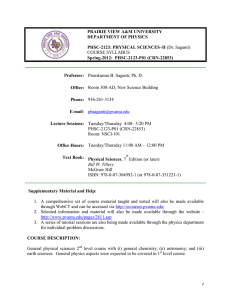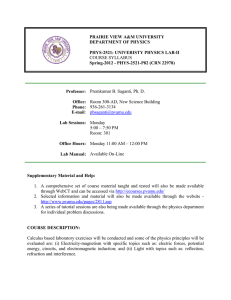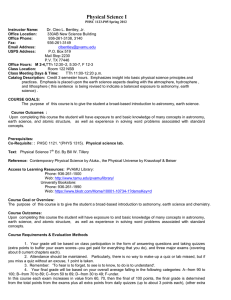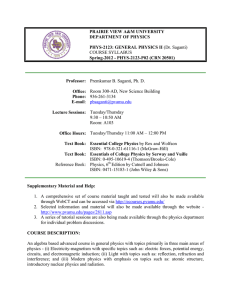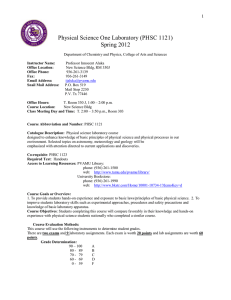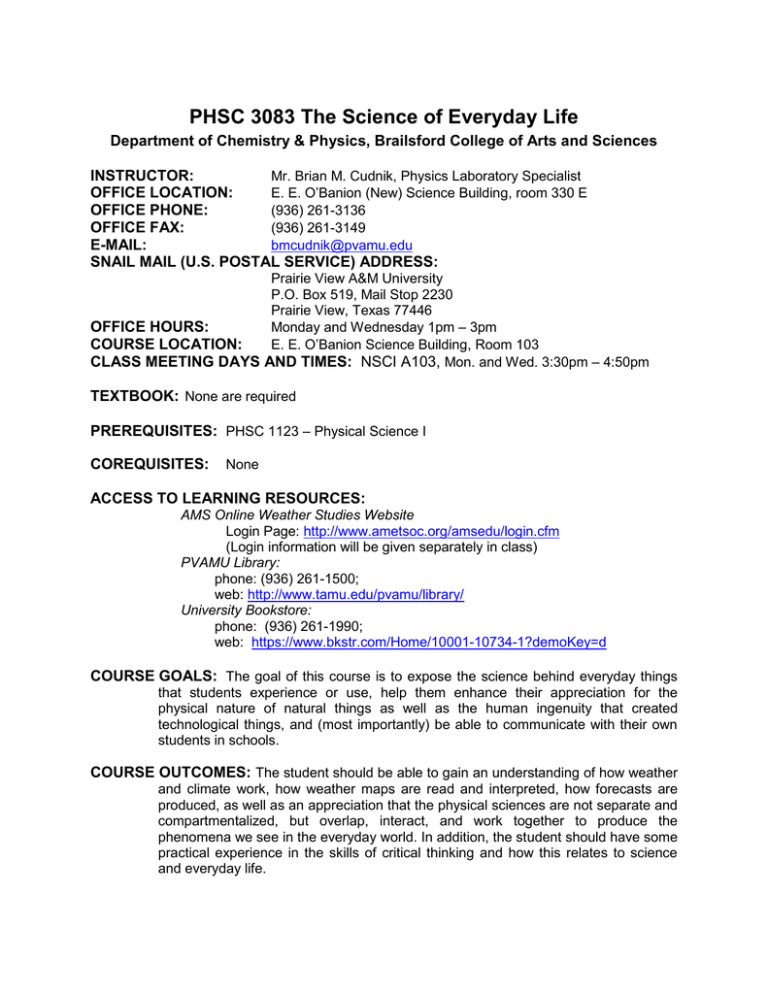
PHSC 3083 The Science of Everyday Life
Department of Chemistry & Physics, Brailsford College of Arts and Sciences
INSTRUCTOR:
Mr. Brian M. Cudnik, Physics Laboratory Specialist
OFFICE LOCATION:
E. E. O’Banion (New) Science Building, room 330 E
OFFICE PHONE:
(936) 261-3136
OFFICE FAX:
(936) 261-3149
E-MAIL:
bmcudnik@pvamu.edu
SNAIL MAIL (U.S. POSTAL SERVICE) ADDRESS:
Prairie View A&M University
P.O. Box 519, Mail Stop 2230
Prairie View, Texas 77446
OFFICE HOURS:
Monday and Wednesday 1pm – 3pm
COURSE LOCATION:
E. E. O’Banion Science Building, Room 103
CLASS MEETING DAYS AND TIMES: NSCI A103, Mon. and Wed. 3:30pm – 4:50pm
TEXTBOOK: None are required
PREREQUISITES: PHSC 1123 – Physical Science I
COREQUISITES:
None
ACCESS TO LEARNING RESOURCES:
AMS Online Weather Studies Website
Login Page: http://www.ametsoc.org/amsedu/login.cfm
(Login information will be given separately in class)
PVAMU Library:
phone: (936) 261-1500;
web: http://www.tamu.edu/pvamu/library/
University Bookstore:
phone: (936) 261-1990;
web: https://www.bkstr.com/Home/10001-10734-1?demoKey=d
COURSE GOALS: The goal of this course is to expose the science behind everyday things
that students experience or use, help them enhance their appreciation for the
physical nature of natural things as well as the human ingenuity that created
technological things, and (most importantly) be able to communicate with their own
students in schools.
COURSE OUTCOMES: The student should be able to gain an understanding of how weather
and climate work, how weather maps are read and interpreted, how forecasts are
produced, as well as an appreciation that the physical sciences are not separate and
compartmentalized, but overlap, interact, and work together to produce the
phenomena we see in the everyday world. In addition, the student should have some
practical experience in the skills of critical thinking and how this relates to science
and everyday life.
COURSE EVALUATION METHODS:
This course will utilize the following assessment instruments to determine student grades and
proficiency of the learning outcomes for the course (point values given in the table):
Exams – written tests designed to measure knowledge of presented course
material, in the form of a mid-term exam and a final exam.
Exercises – written assignments designed to supplement and reinforce course
material: one-page summaries on various topics related to the course and
six in-class critical thinking (or related) exercises.
Tem Paper – A paper will be assigned that will be on a related topic of the
student’s choice. The student will present his/her findings in class for a
separate grade (in class oral presentation).
Class Participation – daily attendance / participation in class discussions
Instrument
Assignments-summary
1-page papers
Critical Thinking
Exercises
In-class Oral
Presentations
Term Paper
Mid-term Exam
Class Participation/
Discussion
Final Exam
Total:
Value (points & percentages)
Total
10 assignments at 10 points each (22% course grade)
100
6 assignments at 10 points each (13% course grade)
60
2 exercises at 15 points each (7% course grade)
30
1 paper at 30 points (7% course grade)
1 exam at 100 points (22% course grade)
30 points (7% of course grade)
100 points (22% of course grade)
30
100
30
100
450
Makeup exams and other forms of makeup activities will be given only for university-approved
absences verified in writing. Homework is to be turned in on time; no late homework will be
accepted unless circumstances warrant. As mentioned above, there will be a variety of
elements used in determining the final grade for this course. Reading assignments will be given
regularly; it is important to keep up with them, as they will help to enhance the in class
experience as well as your experience on the exams.
The grading system is as follows:
A 90 – 100% (405 to 450 points)
B 80 – 89% (360 to 404 points)
C 70 – 79% (315 to 359 points)
D 60 – 69% (270 to 514 points)
F
0 – 59%
( 0 to 269 points)
ATTENDANCE POLICY: Class will start and end on time as indicated in the schedule above.
Attendance at every class is expected and is each student’s responsibility-it is
also imperative that you be on time as much as it is possible. Absence or
tardiness, accumulated from day 1, may result in lowered grades; excessive
absenteeism, whether EXCUSED or UNEXCUSED, may result in a student’s
course grade being reduced or assignment of a grade of “F”.
UNIVERSITY RULES AND PROCEDURES:
Disability statement (See Student Handbook):
Students with disabilities, including learning disabilities, who wish to request accommodations in class
should register with the Services for Students with Disabilities (SSD) early in the semester so that
appropriate arrangements may be made. In accordance with federal laws, a student requesting special
accommodations must provide documentation of their disability to the SSD coordinator.
Academic misconduct (See Student Handbook):
You are expected to practice academic honesty in every aspect of this course and all other courses.
Make sure you are familiar with your Student Handbook, especially the section on academic misconduct.
Students who engage in academic misconduct are subject to university disciplinary procedures.
Forms of academic dishonesty:
1. Cheating: deception in which a student misrepresents that he/she has mastered information
on an academic exercise that he/she has not mastered; giving or receiving aid unauthorized
by the instructor on assignments or examinations.
2. Academic misconduct: tampering with grades or taking part in obtaining or distributing any part
of a scheduled test.
3. Fabrication: use of invented information or falsified research.
4. Plagiarism: unacknowledged quotation and/or paraphrase of someone else’s words, ideas, or
data as one’s own in work submitted for credit. Failure to identify information or essays from
the Internet and submitting them as one’s own work also constitutes plagiarism.
Nonacademic misconduct (See Student Handbook)
The university respects the rights of instructors to teach and students to learn. Maintenance of these
rights requires campus conditions that do not impede their exercise. Campus behavior that interferes with
either (1) the instructor’s ability to conduct the class, (2) the inability of other students to profit from the
instructional program, or (3) campus behavior that interferes with the rights of others will not be tolerated.
An individual engaging in such disruptive behavior may be subject to disciplinary action. Such incidents
will be adjudicated by the Dean of Students under nonacademic procedures.
Sexual misconduct (See Student Handbook):
Sexual harassment of students and employers at Prairie View A&M University is unacceptable and will
not be tolerated. Any member of the university community violating this policy will be subject to
disciplinary action.
Attendance Policy:
Prairie View A&M University requires regular class attendance. Excessive absences will result in lowered
grades. Excessive absenteeism, whether excused or unexcused, may result in a student’s course grade
being reduced or in assignment of a grade of “F”. Absences are accumulated beginning with the first day
of class. It is also imperative that you be on time as much as it is possible. You can find more details in
the University Undergraduate Catalog (2005 – 2007, p.111).
Student Academic Appeals Process
Authority and responsibility for assigning grades to students rests with the faculty. However, in those
instances where students believe that miscommunication, errors, or unfairness of any kind may have
adversely affected the instructor's assessment of their academic performance, the student has a right to
appeal by the procedure listed in the Undergraduate Catalog and by doing so within thirty days of
receiving the grade or experiencing any other problematic academic event that prompted the complaint.

